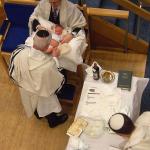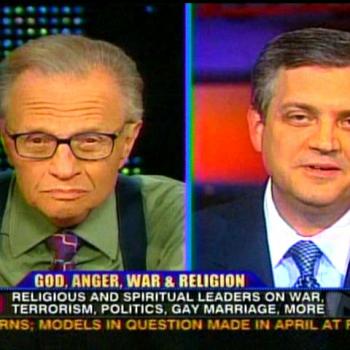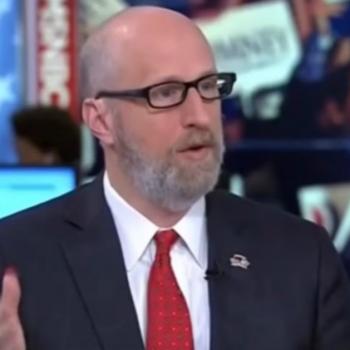Joe Carter thinks it is safe to segregate Christianity from American nationalism (on the eve of July 4th no less when Roman Catholics themselves are observing the Fortnight of Freedom). He writes:
America has done a fine job of incorporating Rousseau’s “dogmas of civil religion,” keeping them “few, simple, and exactly worded.” We have restricted such sentiments to the most unobtrusive areas, allowing “In God We Trust” to be printed on our coins, and the phrase “under God” to slip in our Pledge of Allegiance (which, curiously, isn’t a pledge of “allegiance” to God but to a flag). We allow recognition for a “Divinity, possessed of foresight and providence,” but what we don’t allow is the recognition of Jesus as God.
And that is what should give Christians pause.
There is a vast and unbridgeable chasm between America’s civil religion and Christianity. If we claim “under God” refers only to the Christian, trinitarian conception of God, we are either being unduly intolerant or, more likely, simply fooling ourselves.
Do we truly think the Hindu, Wiccan, or Buddhist is claiming to be under the same deity as we are? We can’t claim, as Paul did on Mars Hill, that the “unknown god” they’re worshiping is the God of Abraham, Isaac, and Jacob. They have heard of Jesus—and reject him as God.
The Pledge of Allegience is a secular document, and the “under God” is referring to the Divinity of our country’s civil religion. Just as the pagan religion of the Roman Empire was able to incorporate other gods and give them familiar names, civil religion provides an umbrella for all beliefs to submit under one nondescript, fill-in-the-blank term.
As someone who holds to the principle of the spirituality of the church, that the church’s mission is spiritual (salvation of the lost) and that the church’s means (word and sacrament) are spiritual in character, it is hard to disagree with Carter.
But what he (and his colleagues at The Gospel Coalition) don’t seem to consider is that while they want to remove U.S. flags from rooms where Christians worship (does he really?), much of what Carter writes for TGC follows U.S. politics and gives the coverage a Christian (or gospelly) slant. So if he wants to remove Americanism from the church, why can’t Carter separate Christian convictions from national matters that involve believers and unbelievers?
For instance, Carter reported (and seemed to defend) the National Day of Prayer:
Today is the National Day of Prayer, an annual day of observance celebrated by Americans of various faiths. Here are nine things you should know about the day when people are asked “to turn to God in prayer and meditation.”
I did not see Carter raise any questions about whether that “God” is the triune God of the Bible or one that lets all sorts of deities in.
Carter also produced a sort of informercial for Freedom Sunday and pushed hard for making the end of slavery a function of church life:
Promote action: Scripture is packed with examples of God’s heart to seek justice for the marginalized, enslaved, and oppressed. While Freedom Sunday is the first step to learning about slavery, it cannot stop there. It must be a Sunday that leads people to action, calling people to use the gifts that God has given them—their talent, influence, and resources—to combat slavery. For some, that may be volunteering their time, and for others, that may be giving financially—whatever your means, IJM urges you to get involved.
Unify: History shows that a unified church is unstoppable. We must come together as one church, for one purpose. What a powerful witness to the world when the church is united to end an evil like slavery rather than being united on the defense in a culture war.
By the way, the reason for bringing this up is not to say that the church is for slavery (though Paul does describe himself as a slave to Christ-hey now) but to remember that in the United States, the way often to achieve social reform is through legislation and policy. Churches making Christians aware is ineffective if it does not lead to a political effort, which then brings national affairs (Americanism) into the church.
Then there was Carter’s solution to the Roy Moore problem (evangelicals supporting a Senate candidate who was morally toxic):
Convictional inaction refuses to support any political candidate, organization, or party that advocates for or turns a blind eye to gross immorality and injustice. Every Christian in America would refuse to vote for any candidate—regardless of political party—who supports such gross injustices as abortion or who covers up immorality, including sexual assault.
If every evangelical committed to convictional inaction, politics in American would change within four to five years (about two election cycles). Knowing they were truly at the whim of Christian voters, both parties would be forced to make radical changes. Convictional inaction is a nonpartisan approach that solves our political crisis by literally doing nothing.
Again, Carter leads Christians to think they can change national politics by living out their faith appropriately. That may be true, and it may be worth pursuing. But it hardly separates Christianity from national identity the way Carter proposed when it comes to civil religion. Carter may find civil religion distasteful, but he still harbors a version of Christian nationalism, that is, an expectation that Christians in the U.S. should seek to have their nation reflect Christian morality and beliefs. Maybe he wants to remove the U.S. flag from the local congregation, but Carter seems comfortable with a Christian flag in the White House, the U.S. Capitol, the Supreme Court, maybe even the Library of Congress. In other words, Carter’s “social gospel” is ripe for a civil religion, such as the pass he gave to the Museum of the Bible compared to this assessment in The Atlantic which features the museum’s effort to establish a strong tie between the United States and biblical religion:
Something similar is at work with the Museum of the Bible. “Imagine bringing the word of God into the nation’s capital,” said Cardinal Donald Wuerl, who heads the Catholic archdiocese of Washington. Rick Warren, the California megachurch pastor who serves on the board of the museum, was similarly pleased with the location. It “had to be in the capital,” he told me at the opening.
Although the museum takes a global perspective on the Bible, it is preoccupied with the question of whether America is a biblically rooted nation. While the exhibits portray some conflicting views, the message is clear: The country was forged through Christianity. Video clips show black-shirted actors reciting speeches from the Founding Fathers on religious freedom and the importance of Christianity. Displays explore how Christian preachers used the Bible to justify slavery, revisit the 1920s Scopes trial over evolution, and highlight the Supreme Court’s role in shaping public prayer. Careful attention is paid to the black-church tradition and the history of gospel music; Martin Luther King Jr. figures prominently in the contemporary gallery on the second floor.












